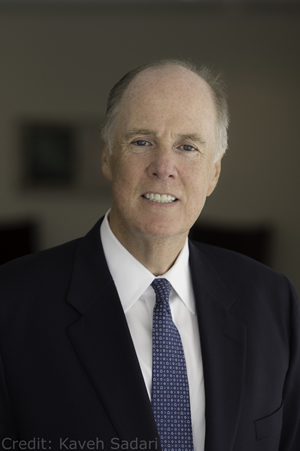
How does one brief the President of the United States every morning on the world’s developments in just 30 minutes? Thomas Donilon – former National Security Advisor in the Obama Administration – reflected on this question while featured in a Jackson Institute Town Hall meeting on November 4.
“Serving as National Security Advisor is like living in dog years,” quipped Donilon. “One year there is like seven years anywhere else.”
Sure enough, Donilon brought no shortage of expertise or perspective to this packed Town Hall event hosted by Kissinger Senior Fellow Ambassador Marc Grossman.
Donilon began by discussing the immensity of work that goes into preparing one of the more than 800 daily briefings that he delivered to President Obama. “The daily briefing was the President’s first meeting of the day…and the staff at the National Security Council – roughly 350 people – would spend the first three-and-a-half hours of the day carving down the world’s most important events to just seven or eight items.”
The former National Security Advisor presented to the Town Hall audience what he believed his hypothetical 801st Presidential Daily Brief would entail.
“We would start with the effects of the Snowden leaks, for sure.” Donilon discussed how the ramifications of the leaks extend far beyond an international embarrassment. Its ripple effects, he noted, can be felt in bilateral and diplomatic relations, such as with Angela Merkel; it can be seen in canceled state visits, with Dilma Rousseff, president of Brazil; and it has left its mark from trade negotiations with Europe to the intelligence community abroad.
He said the second issue would undoubtedly be Iran and the recent rounds of negotiations regarding the nuclear issue. Donilon remarked with cautious optimism, “This is the first conversation between a President of Iran and a President of the United States since 1979 – that cannot be understated – but are the Iranians truly ready to bring something to the negotiating table?”
Though the theme of the talk was national security, economics and trade policy dominated a large portion of the conversation. “The principal security threat to the United States is a troubled economy,” Donilon reflected. “In order to maintain interests abroad, you must have a strong economy back home.” Donilon put forth the importance of the two ongoing, massive trade negotiations – one with Asia and one with Europe – and how their successful passing has the potential to be Obama’s quiet legacy. Not only that, “We are the largest producer of natural gas in the world, and by 2020 we will be the largest producer of gasoline: I think we are just now coming to realize the economic and geopolitical effects of our energy prospects.”
From Syria to Afghanistan, cyber security to U.S. drone policy, Donilon touched upon a gamut of issues, and he did not depart his Yale audience before giving a few words of advice, notably, “The best way to keep a secret in Washington is not to tell anybody.”
